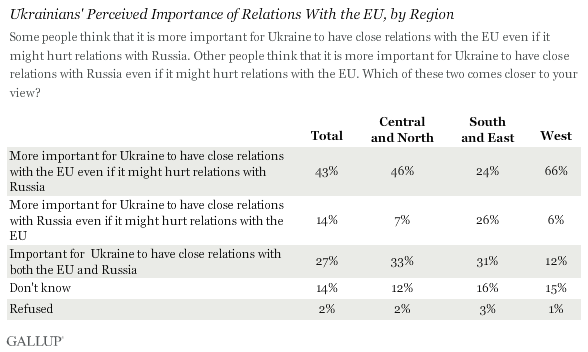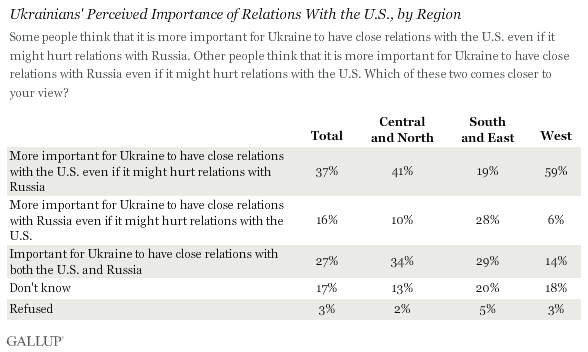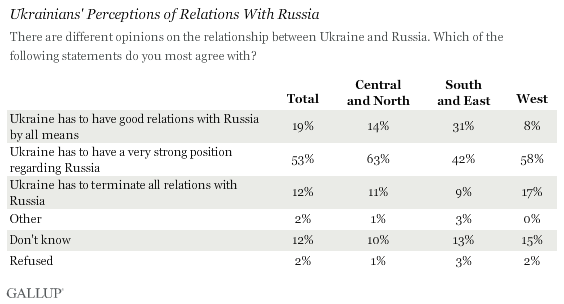Story Highlights
- Ukrainians prefer strong stance toward Russia
- Attitudes toward Russia, U.S., EU vary by region
This article is the second in a weeklong series focusing on the most recent public opinion research data available from Ukraine.
WASHINGTON, D.C. -- More Ukrainians currently believe it is more important to have close relations with the European Union and the U.S. -- even if it might hurt relations with neighboring Russia -- than it is to have close relations with Russia and risk damaging their country's dealings with the West. While some may take this as a sign that the West is winning the tug-of-war with Russia over Ukraine, not all Ukrainians feel this way -- particularly those in the regions closest to Russia -- and many also see the value in maintaining close relations with all parties.

Gallup's interviews in Ukraine this year took place in September and October, following a cease-fire between the Ukrainian government and pro-Russian separatists in the country's East. Gallup's polls in 2014 excluded the Crimea region, which is currently considered occupied territory, and some areas of the Donetsk and Luhansk regions where security was an issue. The excluded areas account for approximately 10% to 13% of Ukraine's adult population.
On the heels of a historic association and free trade agreement between the EU and Ukraine ratified in September, 43% of Ukrainians said is important for their country to have close relations with the EU even if it hurts relations with Russia. Only one in seven Ukrainians (14%) consider it more important to have close relations with Russia even if it hurts relations with the EU. At the same time, more than one in four (27%) said it is important to have close relations with both.
However, this sentiment varies widely by region. While residents in the Russian-leaning South and East are divided, residents in the Central and North region (46%) and the West (66%) are more likely to feel it is more important to have close relations with the EU than with Russia. These two regions are also where protests were strongest after Ukraine's former government abandoned the EU trade deal in 2013 in favor of stronger ties with Russia. But while few in the West favor relations with both Russia and the EU (12%), a sizable 33% in the Central and North region still do.
The EU and the U.S. have both levied sanctions against Russia after its annexation of Ukraine's Crimea region in March and its continued backing of pro-Russian separatists. Similarly, 37% of Ukrainians feel it is more important to have close relations with the U.S., even if it might hurt relations with Russia, and 16% feel it is more important to have close relations with Russia than the U.S. Twenty-seven percent of Ukrainians believe it is important to have relations with both countries.

These responses also vary regionally, with one in five (19%) Ukrainians in the South and East region saying it is more important to have close relations with the U.S. This figure more than doubles in the Central and North region (41%) and triples in the West (59%).
Ukrainians Prefer Strong Stance Toward Russia
The finding that many Ukrainians see relations with the EU and U.S. as more important does not imply they want to end relations with Russia. Only 12% of Ukrainians believe this should happen. Instead, Ukrainians want their country to take a strong stance with Russia. The majority of Ukrainians surveyed (53%) believe Ukraine needs to have a very strong position regarding Russia, while fewer than one in five (19%) feel Ukraine has to have good relations with Russia by all means.

Residents in all regions are most likely to favor a strong position on Russia, which makes sense given that opinions of since the Crimean crisis. However, residents in the Eastern and Southern region are more likely than those from other regions to say good relations with Russia by all means is most important.
Few residents in neighboring Russia (4%) believe their country should terminate all relations with Ukraine, but like Ukrainians, they believe their country has to take a (63%). Only one in five (21%) feel Russia has to have good relations with Ukraine by all means.
Implications
The findings suggest even more disillusionment toward Russia among Ukrainians, especially those in the Central and Northern region and in the West. This change in sentiment toward Russia is likely related to the annexation of Crimea earlier this year and Russia's ongoing support of pro-Russian separatists in the East. However, resentment of Russia's influence was also evident in the protests that led to the revolution. If it lasts, Ukrainians' relative surge in support for relations with the EU and the U.S. could signal a dramatic geopolitical change in the region.
Survey Methods
Results are based on face-to-face interviews with 1,000 adults, aged 15 and older, conducted in Sept. 11-Oct. 17, 2014, in Ukraine. For results based on the total sample of national adults, the margin of sampling error is 卤3.8 percentage points at the 95% confidence level. All reported margins of sampling error include computed design effects for weighting.
Gallup's polls in Ukraine in 2014 excluded the Crimea region, which is currently considered occupied territory, and some areas of the Donetsk and Luhansk oblasts where security was an issue. The excluded areas account for approximately 10% to 13% of Ukraine's adult population.
For more complete methodology and specific survey dates, please review .
Learn more about how the works.

